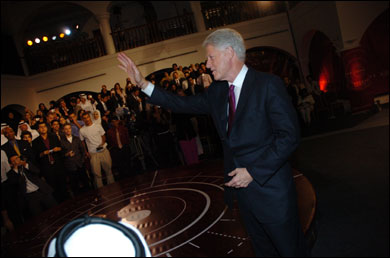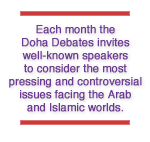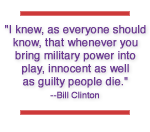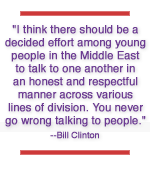|
|
||||
|
|
Students at Qatar Campus Attend Interview with Bill Clinton
Bill Clinton acknowledges the student audience at Qatar Foundation headquarters in Education City.
The interview, part of the Doha Debates series, focused on the demands of leadership, drawing out Clinton on a wide range of subjects, including the current U.S. involvement in Iraq, his own attempts at mediating Israeli-Palestinian peace talks and his decision to bomb Kosovo. He also talked about whether animosity generated by the invasion of Iraq makes it impossible for the U.S. to play the role of peacemaker in the region.
"There is still this moment in world history—it won't last forever—when we have an enormous amount of political and economic and military capacity," Clinton said. "And if people see us using that for peace, it will be a positive thing."
The Doha Debates are a project of Qatar Foundation, a Doha-based nonprofit organization committed to promoting education, scientific research and community development in Qatar and throughout the region. Each month the Doha Debates invites well-known speakers to consider the most pressing and controversial issues facing the Arab and Islamic worlds. The Debates are taped before a live audience in Qatar Foundation headquarters in Doha's Education City and broadcast to an international audience on BBC World.
The interview comprised two parts. Sebastian first interviewed Clinton and then opened the program to questions from the audience, comprising students from schools in Education City and throughout Doha.
"We're delighted to have President Clinton launch our special series of interviews on the demands of leadership," Sebastian said. The purpose of the interview, Sebastian explained, was to gain insight into the thought process of a person in a position of great responsibility—to understand how momentous decisions were made. "How did he carry the awesome responsibilities for trying to make peace in a volatile and dangerous world and what did he find out about himself in the process?"
Of his decision to bomb Kosovo in an attempt to end the massacre of Bonian Muslims and Croatian Christians, Clinton said, "It wasn't a matter of our self-interest. It was a matter of whether we could have a decent 21st century without a European continent that was living up to its ideals of democracy and freedom and human rights for all people who lived there, without regard to their religion or their ethnic background or their economic standing.
He talked about the incremental progress his administration achieved in bringing together Israeli and Palestinian negotiators—progress that was reversed when Yasser Arafat backed out, thus complicating all future peace talks.
Clinton was most thoughtful when a student asked him how young people in the Middle East ought to go about solving the myriad social problems the region faces.
"The first thing I think you should do," Clinton said, gesturing to the audience and the set of the Doha Debates, "is more things like this."
If he were young, he said, he'd get together with likeminded young people and start a conversation about ways that the great windfall brought by rising oil prices might be used to better the region and the lives of its people. He suggested striking up conversations with Israeli students about what they thought there was to gain by holding onto the West Bank, or perhaps with young Iranians about whether they honestly would feel safer with nuclear weapons in their arsenal.
"There will be a premium of perhaps a trillion dollars or so coming into this region in the next several years," Clinton said to the students. "What are you going to do with it? Are you just going to spend it and have a good time or are you going to create more university settings like this one, and more students, and educate more men and women. And once you have educated people, what are you going to do with them?
"How will you build an economy that you would like to be a part of no matter the price or supply of oil? And how will you build an economy that will work for you even if the climate of the globe keeps warming up, and we have drastic changes in the economy and the agricultural production patterns around the world? These are the things you should be thinking about. This is a great gift for you, this oil price, but only if you use it right.
"I think there should be a decided effort among young people in the Middle East to talk to one another in an honest and respectful manner across various lines of division," Clinton said. "I think that's important. You never go wrong talking to people."
The next Doha Debate takes place on December 14. There will be three more Doha Debates Specials, the dates of which have not yet been announced.
"Our series of special interviews will take a look at some of the most influential figures of our time and try to understand what governed their actions," Sebastian explained. "We hope it will be of significant value to our student audiences and bring them a unique understanding of high-level international decision-making."
The Doha Debates are filmed before a live audience at Qatar Foundation headquarters in Education City, an eight-million-square-meter campus outside Doha that hosts numerous educational and research institutions, including branch campuses of five world-renowned universities: Georgetown University, Carnegie Mellon University, Texas A&M University, Weill Cornell Medical College and Virginia Commonwealth University.
For more on the Doha Debates, see http://www.thedohadebates.com
For more on Qatar Foundation, see http://www.qf.org.qa.
Geoff Kelly |
||
|
Carnegie Mellon Home |
||||

 Students at Carnegie Mellon University's branch campus in Qatar recently had the chance to attend a special, live one-on-one interview between internationally renowned journalist Tim Sebastian and former U.S. President Bill Clinton.
Students at Carnegie Mellon University's branch campus in Qatar recently had the chance to attend a special, live one-on-one interview between internationally renowned journalist Tim Sebastian and former U.S. President Bill Clinton.
 The November 16 conversation with President Clinton was the first of four special, one-on-one interviews that the Doha Debates are producing to celebrate Qatar Foundation's 10th anniversary.
The November 16 conversation with President Clinton was the first of four special, one-on-one interviews that the Doha Debates are producing to celebrate Qatar Foundation's 10th anniversary.
 "I knew, as everyone should know, that whenever you bring military power into play, innocent as well as guilty people die."
"I knew, as everyone should know, that whenever you bring military power into play, innocent as well as guilty people die."